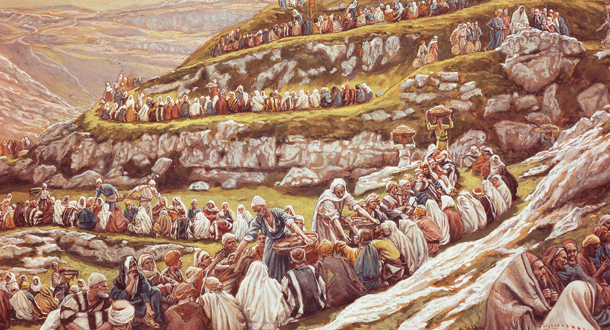
Scripture:
Reflection:
Today we hear the story of Jesus’ multiplication of the loaves and fishes; a story which is found in all four Gospels. In this story there are subtle differences; Jesus takes the initiative to provide food and not the disciples and this action does not come at the end of a long teaching day. Jesus is the one to distribute the bread to the large crowd. The “feeding” is situated around Passover with its echoes of manna from heaven sent to the Israelites as they journeyed through the desert—complaining and testing God. We have the first reference to Passover in chapter two with the Cleansing of the Temple and the third time we will hear mention of Passover will be around Jesus death and resurrection.
Later in this chapter, Jesus will speak about his own body as the Bread of Life—broken and offered for all. In typical Johannine fashion, Jesus is portrayed as knowing what he was about to do as he tests Philip with what seems like an impossible request. There is a parallel reference to a story in 2 Kings where the prophet Elisha feeds a hundred men with twenty barley loaves and they all ate and were satisfied. This story with its eucharistic undertones points to Jesus’ sign of feeding us and satisfying us. The manna which once fell from heaven is now being revealed in Jesus who was sent from heaven.
“…but what good are these for so many?” (v.9). How often might we make that kind of deficit statement to ourselves and/or others when the impossible is placed before us? Surely, we are to see this text with eyes of faith and know that we simply cannot do anything by ourselves. Jesus is always the starting point, we are called to bring what is there—however, impossible—to the attention of Jesus. And, we can never tell what he is going to do, although we are often guilty of trying to anticipate the outcomes—or am I the only one who is tempted to have pre-conceived notions and expectations of the movements of God? When Jesus is given the freedom to act, when we truly release our “impossibles” to him, his answer is always a surprise.
Consider the story in Acts from our first reading. We have the Apostles rejoicing in their flogging; completely disregarding the Sanhedrin’s warning to stop preaching. We’re told that “all day long, both at the temple and in their homes, they did not stop teaching and proclaiming the Christ, Jesus.” (v.4)
Can this be the same men who denied and abandoned Jesus; even hiding in the upper room in fear? They certainly have conquered their fear. Impossible becomes possible; they are not the same men, post-resurrection. God’s faithful abundance.
We need to learn from this, take courage and believe in ourselves-in-Christ. We give our situations to Jesus and however impossible our life’s challenges, we need to absorb the fact that we are always found worthy in our limitations. Our weakness is made perfect in Christ. Alleluia, alleluia.
Jean Bowler is a retreatant at Mater Dolorosa Passionist Retreat Center in Sierra Madre, California, and a member of the Office of Mission Effectiveness Board of Holy Cross Province.

What a spectacular reflection! All things are possible/with gods help!